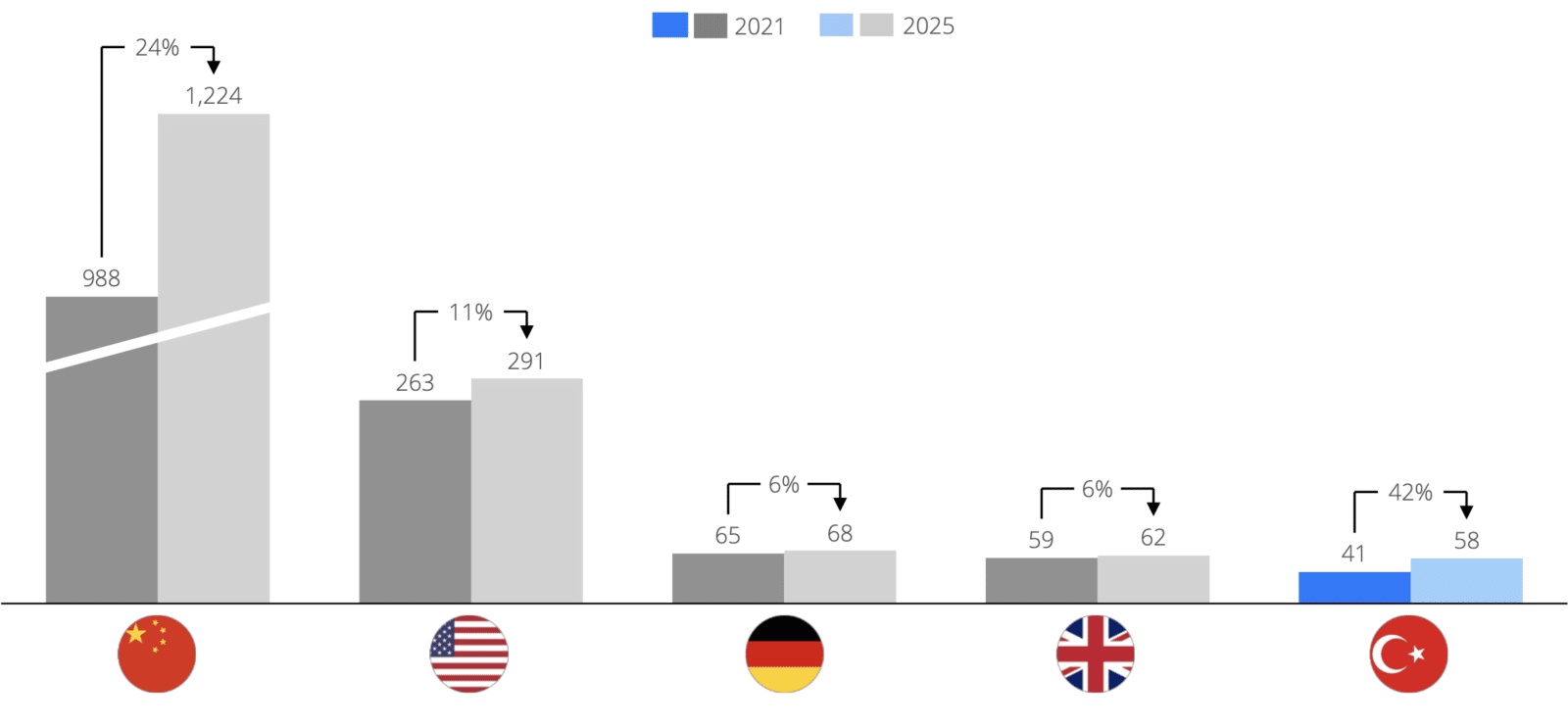Türkiye – a promising market for eCommerce?
This article discusses the eCommerce development in Türkiye, a promising market for the years to come. According to the Statista Digital Industry Outlook, the Türkiye eCommerce market is likely to grow in the next years. The compound annual growth rate (CAGR 21-25) over the next four years is expected to be 15%. In comparison to the 38% year-over-year increase between 2020 and 2021, this fall in annual growth indicates a crowded market. However, internet penetration in Türkiye is 40%, indicating that 40% of the Türkiye population will have purchased at least one item online in 2021.
Key Messages
- By 2025, the number of eCommerce users in Türkiye is predicted to increase by 42% to 58 million. 35% of online buyers in Türkiye have a high family income.
- In Türkiye, 48% of the population shops online. Clothing, Shoes, and Food & Drinks are the top three online shopping interests.
- When making a large purchase, 79% of internet customers conduct research online.
- Consumer electronics and clothing are the most popular internet searches. Clothing and shoes are the most popular online buying categories.
According to eCommerceDB, Türkiye is the 18th largest eCommerce market, with sales of US$16.3 billion in 2021, ahead of Sweden but behind the Netherlands. The Türkiye eCommerce market increased by 38% in 2021, contributing to a global growth rate of 15%. Global eCommerce sales, like those in Türkiye, are likely to rise in the coming years. Global expansion will continue in the next years as new markets emerge. Türkiye is anticipated to surpass the world average of 6% with an annual growth rate of 15% between 2021 and 2025.
NielsenIQ’s study, “Turkey’s e-commerce growth trend presents big opportunities for online players“, concludes that higher product variety and cheaper prices are major motivators for Türkiye’s consumers. The top reasons for shopping online in the Middle East and Africa region are higher product variety (71%) and cheaper prices (68%) while saving time (67%), and shopping faster (58%) are most important for Türkiye shoppers. Shoppers also reported that shopping for products available exclusively online (22%) was also a major motivator.
Looking from a digital side, mobile devices accounted for more than three-fifths of all eCommerce sales in Türkiye in the first half of 2021. Mobile commerce is growing in Türkiye, according to Stats – Global E-Commerce Intelligence, with a major portion of the country’s online buyers choosing to make purchases via mobile devices. The mobile platform accounted for around three out of every five online purchases in Türkiye in the first half of 2021. Furthermore, more than half of Internet users polled completed an online transaction on a mobile device in the third quarter of 2020. In 2021, the most popular product categories purchased online in the UK were clothing, shoes, and accessories, followed by delivery from restaurants, fast food chains, catering services, and food or drink from stores or meals.

Graphic 1. The number of eCommerce users is expected to grow by 42% to 58 million users in Türkiye by 2025. Online shopper characteristics: user development. // Source: Statista

Graphic 2. With about US$3 billion, Fashion is the largest category in Türkiye’s eCommerce. eCommerce net sales of the top 100 online stores in Türkiye in million US$ in 2020. // Source: Statista

Graphic 3. The market volume of the top 5 Türkiye stores has increased by 182% since 2018. eCommerce net sales of the top online stores in Türkiye// Source: Statista
About heyworld.
heyworld GmbH was established in 2019, as a 100% subsidiary of Lufthansa Cargo, specialized in cross-border, eCommerce logistics. heyworld translates airfreight processes and standards into the eCommerce world (ex. conversion of chargeable weight into a parcel level-based pricing scheme). We combine airfreight, eCommerce, and logistics know-how, working with a modular service, from first mile, middle mile (air freight) to end mile. We are well Integrated into Lufthansa handling process, and connected to all service providers and process steps via API integration.
You might also be interested in …
